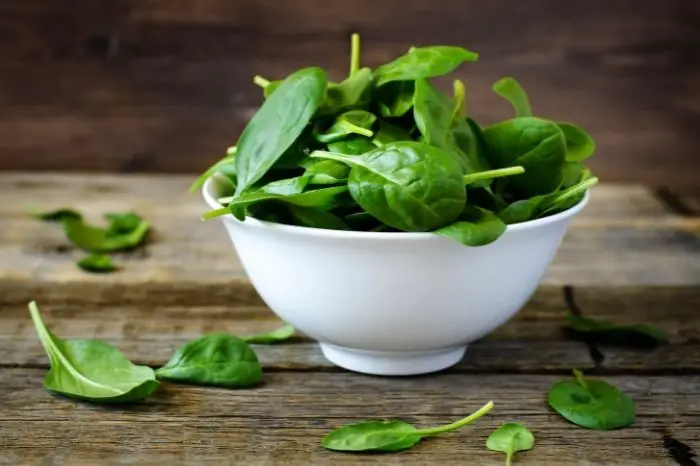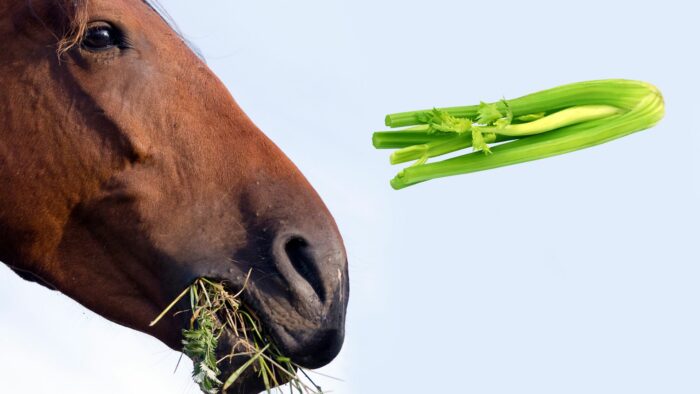Last Updated on March 14, 2023
Horses like to eat many different things, but can horses eat spinach? And is spinach good for horses? Let’s find out!
What is Spinach? Can Horses Eat Spinach?
Spinach is a leafy green vegetable, popular all around the world. When it comes to human nutrition, spinach is referred to as a superfood, as it has so many nutritional benefits. This vegetable can be consumed both cooked and raw and is full of nutrients that are good for human health.
There are actually two plants that are referred to as spinach. The first of these is ‘true’ spinach, a leafy green annual plant. You may also come across perpetual spinach, which is a form of biennial chard.

Spinach is used in many cuisines around the world and is very popular in Asian cookery. But can horses eat spinach, or is it just for humans? Let’s find out!
Click Here to Get Info about:
- What Is A Teacup Dwarf Pony? Everything You Need To Know About Miniature Ponies!
- Can Horses Eat Honey?
Can Horses Eat Spinach?
In terms of digestion, horses are very different from humans, and they cannot eat all the same foods as we can. Horses are herbivores – this meant that they eat plant material, such as grasses, herbs, and trees. So, as spinach is a plant, does this mean that horses can eat spinach? It is safe to feed a small amount of spinach to horses, as a snack or treat. However, spinach should not be fed to horses in large amounts, or as part of the main diet.
The reason for this is that the digestive system of the horse is very sensitive, and if horses eat too much of a food they are not accustomed to they can suffer from some unpleasant side effects. This happens as a result of the activity of bacteria in the intestines, which becomes imbalanced when too much of the wrong type of food is consumed.
Two things may happen when a horse eats too much spinach. Firstly, the bacteria may produce excessive amounts of gas when they digest the spinach. Too much gas in the intestines can be very uncomfortable for the horse, causing symptoms of stomach pain or colic.
The second problem that can occur is diarrhea. Spinach has high water content, and if the horse cannot digest it properly then the feces will become soft and watery. Diarrhea is potentially very dangerous for horses, as it can lead to dehydration and malnutrition. So, while your horse may enjoy eating a few spinach leaves, don’t be tempted to start feeding a large amount!
Is Spinach Good for Horses?
Spinach contains high levels of calcium, magnesium, and iron, and in humans, it is known to have many health benefits. Eating spinach can boost levels of antioxidants in the body, helping to fight cancer and reduce the risk of diabetes. Spinach also supports bone health and helps with weight loss.
But does spinach have these benefits when fed to horses? To gain any nutritional benefits, you would need to feed a lot of spinach to horses. And as we have already realized, large amounts of spinach can cause digestive problems in horses. Horses are not accustomed to eating spinach, and they will not get the same nutritional benefits from it as we do.
Spinach should only be fed to horses in small amounts, and these quantities are unlikely to provide a huge nutritional boost. However, spinach is a healthy and refreshing snack for horses, so feeding a few leaves on an occasional basis will not do any harm to your horse.
How to Feed Spinach to Horses – Can Horses Eat Spinach?
The vital thing to remember when feeding spinach to horses is to only feed small amounts. The recommended amount is no more than half a cup of spinach per day – this is about the same amount as a small handful of spinach leaves. You can feed them to your horse by hand, or add them to his food bucket.
Spinach leaves must be washed before they are fed to horses, as they can contain traces of chemicals such as pesticides and fertilizers. Check the leaves carefully for any that are past their best – any soft or slimy spinach leaves should be discarded, and never fed to horses.
Some horses may not enjoy eating spinach, as the taste can be quite unusual. If this is your horse, he may prefer to eat more normal treats such as carrots and apples.
What Human Foods Can Horses Eat? 7 Fun Snacks for Your Horse!
OK, so while spinach might not come top of the list of treats to feed your horse, there are some tasty human foods that your horse will definitely enjoy!
We all know the obvious human treats that horses enjoy – apples, carrots, and sugar lumps definitely come top of the list! But there are some other more unusual foods that your horse would definitely like to snack on given the chance.
Here are 7 delicious human foods that are safe and healthy for horses to eat:
- Bananas
- Grapes
- Strawberries
- Melon
- Granola
- Blueberries
- Raspberries
Put all these together, and you’ve got a deliciously tasty fruit salad to share with your horse! This can be a fun way to share a picnic while out on a long trail ride, providing your equine companion with some juicy sweet fruit that will re-energize and rehydrate you both.
As with any unusual food for horses, these treats should only ever be fed in moderation. The horse’s digestive system is designed to eat mostly forage, in the form of grass and hay. Too much of any other type of food can disrupt the balance of bacteria in the digestive system, leading to gassiness, colic, or diarrhea.
While horses can eat most types of fruit, some vegetables should never be fed to horses. Any plant from the cabbage family, including broccoli, cauliflower, and Brussels sprouts, can cause excessive gas production in the digestive tract. Sugary treats such as chocolate and peppermints can lead to weight gain and obesity if fed in large amounts. Potatoes, tomatoes, and onions should never be fed to horses.
Do horses eat pumpkins?
In the fall, pumpkins are in abundance, and many of us are left with a glut of orange pumpkins after a Halloween celebration! And as there is only so much pumpkin pie we can eat, is it safe to feed the leftovers to your horse?
Horses can eat pumpkins, and all parts of the pumpkin are safe for horses to eat, including the skin and seeds. However, as with any new or unusual food, only a small amount of pumpkin should be fed to your horse to avoid digestive issues such as bloating, colic, or diarrhea.
If your horse has never eaten pumpkin before, cut a few small bite-size pieces and try feeding them by hand. This will help reduce the risk of choking. Never feed pumpkins to horses that have gone rotten or slimy, or that have been contaminated with candle wax, paint, or glitter.
Is celery good for horses?
Celery is a great treat to feed to horses, as it is low in sugar and packed full of beneficial vitamins and minerals. This makes it the ideal snack for horses that are on a calorie-controlled diet or are prone to weight gain. The high water content of celery will also help to keep your horse refreshed and hydrated on a hot day or a long trail ride.
When offering celery to your horse for the first time, cut the stalk into bite-size chunks and feed it by hand. If your horse enjoys this snack, next time try offering a whole stalk or two for him to chew on.
Summary – Can Horses Eat Spinach?
So, as we have learned, horses can eat spinach in small quantities, as a treat or snack. Large amounts of spinach may cause digestive problems in horses, such as colic or diarrhea. Spinach should be washed before it is fed to horses, to remove any residues of chemicals such as pesticides or fertilizers.
We’d love to hear your thoughts on whether can horses eat spinach! Does your horse enjoy eating some unusual fruits and vegetables? Or maybe you’ve got some questions about the best food to give to your horse. Leave a comment below and we’ll get back to you!
FAQs

Kate Chalmers is a qualified veterinary nurse who has specialized in horse care for the vast majority of her career. She has been around horses since she was a child, starting out riding ponies and helping out at the local stables before going on to college to study Horse Care & Management. She has backed and trained many horses during her lifetime and competed in various equestrian sports at different levels.
After Kate qualified as a veterinary nurse, she provided nursing care to the patients of a large equine veterinary hospital for many years. She then went on to teach horse care and veterinary nursing at one of the top colleges in the country. This has led to an in-depth knowledge of the care needs of horses and their various medical ailments, as well as a life-long passion for educating horse owners on how to provide the best possible care for their four-legged friends.
Kate Chalmers BSc (Hons) CVN, Dip AVN (Equine) Dip HE CVN EVN VN A1 PGCE


